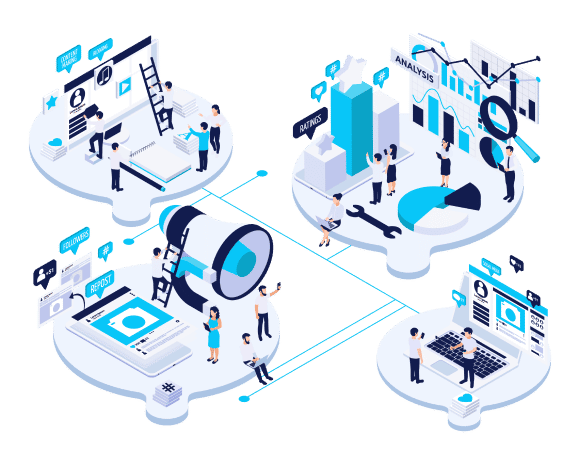Helping With AI-enabled Process and Data Transformation
Through the structured approach of building an AI-enabled target operating model that integrates all critical dimensions—agentic and human processes, data, and systems.

Problems Companies Face
When They Need Help With AI-enabled Process and Data Transformation
Facing process or data challenges and wondering if AI could help? Unsure whether the root cause lies in your processes, technology, or both? Do you have a clear vision of your future AI-enabled operating model? Have you considered how agentic and human processes, data, and systems will work together? Are you ready to build a model that can support and sustain AI-driven transformation?
Current Process Issues: Unclear If AI Can Resolve
Battling major process bottlenecks but unsure whether AI is the cure? ElevatIQ validates AI’s real-world fit for your specific process challenges before you commit.
Limited Expertise in Designing AI-enabled Target Operating Model
Unsure how to reshape workflows, roles, and governance for an AI‑driven future? Our experts guide you through consensus-building and the design of a pragmatic, AI‑ready operating model.
Data Problems: Clean First or Let AI Help?
Debating whether you must cleanse data before gaining AI value—or if AI itself can remediate data issues? We diagnose your data landscape and lay out the best‑fit approach.
Unsure How to Go from Point A to Point B with AI Adoption
Started experimenting but lack a clear roadmap—or confidence you’re on the right path? We provide a structured framework that moves your organization forward with measurable milestones.
System‑to‑System Communication Gaps
Vendors promise AI will make your applications “talk,” but will it in practice? ElevatIQ confirms where AI integrations truly deliver seamless connectivity—and where they won’t.
Limited Visibility into AI’s Impact on Your Business Model
Struggling to predict how AI trends will disrupt offerings and revenue streams? ElevatIQ models future scenarios so you can pre‑empt competitive threats and seize AI‑driven opportunities.
Want to learn more about why independent advisors have a higher success rate with AI initiatives?
Our Case Studies for
AI-enabled Process and Data Transformation

ECommerce Supply Chain Transformation With ERP Selection
Download the eCommerce Supply Chain transformation case study and learn how LockNLube transformed its inventory and supply chain challenges by consolidating over 20 systems. As well as by creating business, process, information, and system architecture as they prepare for the next phase of their growth.

Omnichannel eCommerce Customer Experience Transformation
Download the omnichannel eCommerce customer experience case study and learn how fashion retailer AKIRA built a digital roadmap and managed stakeholder expectations to transform its processes and systems to explore newer business models such as buy-online-pickup-in-store and curbside pickup.

ERP Implementation Failure Recovery
Download the ERP implementation failure recovery failure case study and learn how Frederick Wildman struggled with Microsoft Dynamics 365 ERP implementation failure even after spending over $5M and what options they had for recovery.
Our Methodology
for AI-enabled Process and Data Transformation
The process begins with data collection, followed by analysis and the creation of a tailored questionnaire and RAID logs. Through an iterative approach—including interviews, current process demonstrations, training sessions, and consensus-building workshops—a target operating model is developed.

1 Data Collection
This phase focuses on data collection and secondary research to form an initial hypothesis, which is then reviewed and refined through discussion. The output of this phase would be RAID logs and questionnaires.
3 Target Operating Model Creation
Once teams agree on the desired state, this step documents the initial state for further feedback and alignment.
5 Optional: Report Preparation
If a formal report or executive presentation is required, this phase focuses on its development.
2Iterative Workshops
The purpose of this phase is to go through each item in the RAID logs, coaching internal teams on core concepts, reviewing current user workflows, and building draft versions of the target operating model.
4Target Operating Model Recalibration
Visualization helps teams understand their own needs better and align with the target state. This is an iterative process to seek feedback until the teams agree on the finalized state.
Ready to learn how we can help With AI-Enablement Strategy and Planning?
Our
Other Artificial Intelligence Consulting Services
AI-Enablement Strategy and Planning
Our AI Strategy and Planning begins with a deep assessment of your current challenges, followed by a rapid roadmap outlining multiple paths forward—whether through modernizing existing systems or adopting new technologies. Each option is supported by a detailed business case, highlighting its pros, cons, risks, and potential rewards.
AI Technology Procurement Decision Support
This service supports formal procurement processes for AI technologies, including conducting benchmarks to inform decision-making. Once potential solutions are identified, ElevatIQ helps develop a structured RFP and consensus-building framework, source potential vendors, and facilitates vendor engagement—guiding negotiations until the client is fully confident in their selection.
AI Implementation and Change Management
This service supports the implementation of the target operating model by integrating key dimensions—including agentic and human business processes, data, and technologies. ElevatIQ works closely with end users and vendors to continuously recalibrate the model as assumptions shift and business context evolves.
AI Project Recoveries
This service focuses on recovering and rescuing struggling AI projects, including collaboration with technology lawyers for mediation, arbitration, or litigation support. Organizations without a clearly defined target operating model often face operational disruptions and challenges in controlling costs. ElevatIQ conducts a comprehensive assessment—reviewing implementation plans, requirement states, architectural documentation, testing strategies, migration and communication plans, and active contractual obligations—to develop a clear, actionable roadmap for getting the project back on track.
AI-native Cx and Operational Strategy
This service helps companies understand how their peers and competitors are leveraging AI to transform their Cx workflows and operations. It also clarifies how AI-native workflows and experiences differ from traditional, non-AI approaches. As part of the engagement, ElevatIQ develops a rapid roadmap outlining various options—each with a clear view of the pros, cons, risks, and potential rewards.


